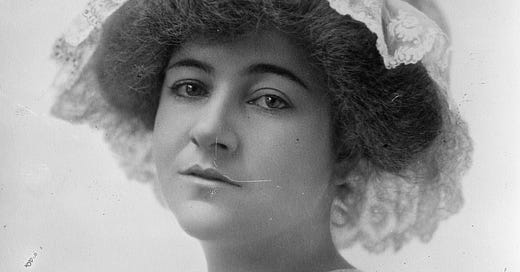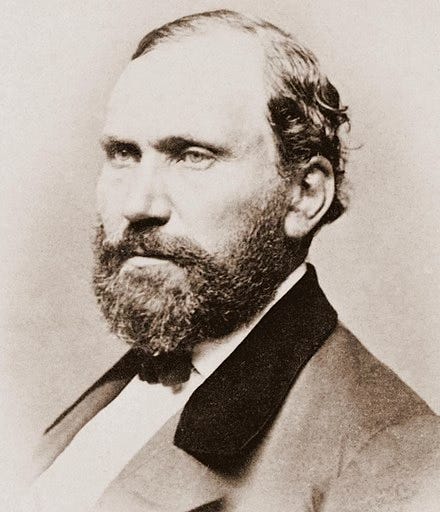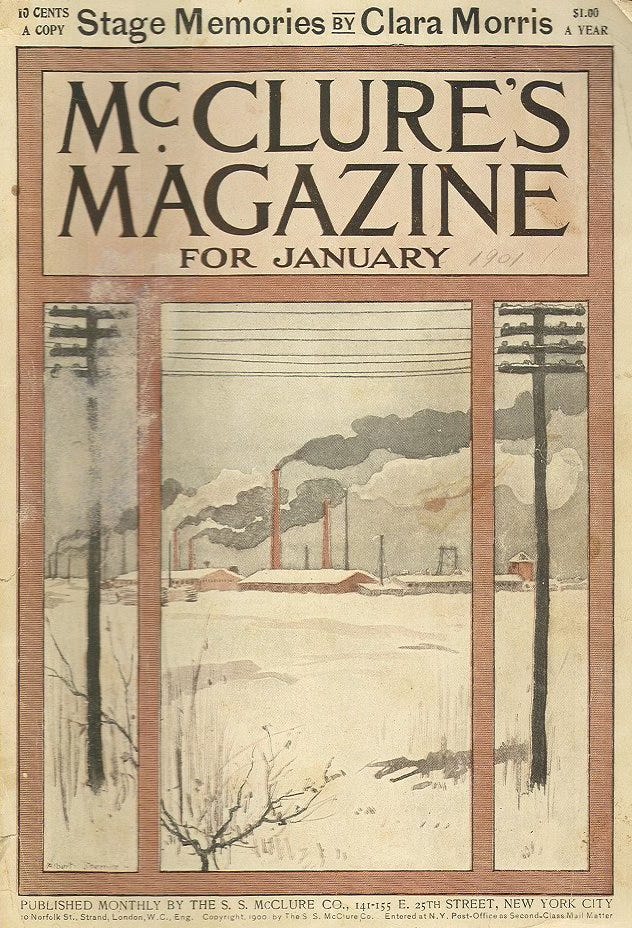What happened to Dorothy Arnold?
The mysterious disappearance of a young New Yorker foxed everyone - including private detectives from the famous Pinkerton's agency
Today, a story from across the Atlantic. Although I concentrate on British detectives on this substack, I've chosen this tale as it's about a case I've been fascinated by for years.
In 1910, Dorothy Arnold, a wealthy 25-year-old New Yorker, went out to run some errands. She never returned home. On the surface, she seemed like a woman with everything to live for: she was from a wealthy family, was educated, and her parents were hoping for her to find a nice young man for her to settle down with.
Dorothy Arnold (from the Library of Congress)
Of course, things are often not what they appear. Her father, Francis, was controlling; he refused to let Dorothy leave home and live independently. He had a very firm idea of what type of man she should marry - Dorothy disagreed. She also wanted a career as a writer, but her family mocked her for her ambitions.
On one cold December morning in 1910, dressed in blue, with a fur muff to help protect her from the chill, Dorothy left her family's home at 108 East 79th Street. She had told her mother that she wanted to go shopping for a dress to wear to her younger sister's wedding. She was spotted during the day at various locations: walking from her home to a store on the corner of 59th Street and Fifth Avenue; buying a box of chocolates at midday; then walking nearly a mile and a half to a bookstore at 27th Street, where she bought a book of essays by another female author. Those who served her said she appeared polite, with nothing out of the ordinary about her behaviour.
When she left Brentano's bookshop, Dorothy bumped into a friend, and they chatted about an upcoming party. The friend. Gladys King, said Dorothy was in 'good spirits'. Dorothy told Gladys she had to go as she was meeting her mother for lunch, and was going to walk through Central Park to get to their meeting place - the Waldorf Astoria. Just before 2pm, on 27th Street, Dorothy started walking, turning round twice to wave goodbye to Gladys. That was the last time anyone saw her, and there is no evidence that she did any shopping for the dress for her sister Marjorie's wedding.
Her family soon realised that Dorothy was missing - she failed to return for dinner, which was unheard of. But rather than call the police, they kept the matter quiet. When a friend telephoned, Dorothy's mother lied and said she had gone to bed with a headache. Although they called other friends to see if Dorothy was with them, they did not want to involve police because it would draw attention and be 'embarrassing' for them. Instead, they contacted a lawyer friend and got him to investigate - but despite visiting hospitals, morgues and prisons in three different cities, he found nothing. He then suggested that the Arnolds employ private detectives.
The family duly got in touch with the most famous agency in America - Pinkerton's. Pinkerton's was established in the mid 19th century by Scots emigre Allan Pinkerton. Initially a small operation in Chicago, it rapidly became successful, thanks in part to Pinkerton's eye for publicity, and its work preventing a previous assassination attempt on Abraham Lincoln, as well as lucrative work on the railroads, investigating thefts. Now, in 1910, it was a firm famous worldwide, with a formidable reputation.
Allan Pinkerton
Pinkerton's sent more than one of their detectives to New York to help find out what had happened to Dorothy. I don't know how many, or what their names were, but the Arnolds had plenty of money for the investigation, and reports clearly state that multiple detectives were assigned to the case. They undertook a systematic search of New York hospitals, and visited places Dorothy was known to frequent to see if she was there. They then talked to her friends, and classmates from Bryn Mawr College, where she had previously studied literature, but nobody had seen her since Gladys had said goodbye to her.
The detectives then tried to think about the reasons why a 25-year-old single woman may have wanted to leave her family. Because the family lawyer, John S Keith, had found promotional material for ocean liners in her room, the detectives developed the theory that she might have been in a relationship and eloped with her lover to Europe, travelling on a transatlantic ship. Detectives even travelled to Europe to search ships arriving from New York, but Dorothy was not found on any of them. Two Pinkerton's men visited the Marriage Licence Bureau and pored over their records to see if a licence had been issued for Dorothy, but to no avail. If she had applied in a false name, they could not have found that either.
This was, ultimately, a case that Pinkerton's could not crack. After they admitted defeat, they also managed to persuade Dorothy's father to call the police. By this point, several weeks had passed since Dorothy had gone missing.
Various hypotheses have since been posited. Dorothy had been disappointed professionally - she had had two article rejected from McClure's magazine and was doubting her ability to make it as a writer. Had she killed herself, despondent at the prospect of not establishing a career? This seemed unlikely, given that everyone who had seen her on that final December day had said that she appeared normal, making plans for future events.
Dorothy was keen to write for McClure’s, but had work rejected by them
It also emerged that Dorothy had had a relationship with a man her family disapproved of - George Griscom Jr. After her parents rejected him as their daughter's suitor, Dorothy had spent a week in a hotel with him, and continued seeing him until November, when he went off on a family holiday. Had she eloped with him? He was interviewed and denied all knowledge of what had happened. Subsequently, he spent a small fortune placing adverts in newspapers for her to see, appealing for her to come home. He also employed a detective himself - one Roger O'Mara - who declared himself 'baffled' by the case, but who also believed that Dorothy was still alive and well somewhere.
Various sightings were reported, but none could be corroborated. There were rumours that she might have gone for a backstreet abortion, and that she had died as a result, her death being covered up by the abortionists. Or had she been abducted from Central Park and murdered? There was no proof of anything: all that was known is that Dorothy had gone out on errands on 12 December 1910, and never came home.
Today, the situation remains the same. Dorothy's parents both died in the 1920s, not knowing what had happened to their daughter. We still don't know. Dorothy was certainly a spirited, independent woman who felt stifled by her father's control of her. She was living something of a double life, keeping her relationship with George Griscom under wraps, and lying in order to continue seeing him. She wanted her own life, and her own career, and faced obstacles in achieving either, despite her wealth and apparent opportunities.
Her disappearance was such that the most famous detective agency in the world failed to find her - and neither could the New York police locate her either. Her case is infamous, precisely because it has never been solved. Private detectives often found people, but they could not find Dorothy Arnold.







I like to believe she ran away and changed her name and lived a long and happy life somewhere else...